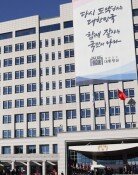Conservatives need more enthusiasm for consolidation
Conservatives need more enthusiasm for consolidation
Posted January. 28, 2020 08:39,
Updated January. 28, 2020 08:39
“They’ve seen people trying harder to get a better deal while on a grocery shopping,” said a senior lawmaker of the main opposition Liberty Korea Party. He talked about the public sentiment towards the conservative parties’ enthusiasm to build a consolidated front before the upcoming general elections, after returning from a visit to his constituency during the Lunar New Year’s holiday. The much-hyped consolidation efforts are so lukewarm that it is hard to tell how much progress it has made, if at all.
In fact, the current consolidation efforts by conservative parties are lagging by a month or two compared the past records, lacking the necessary fuel to advance. The most similar example should be found from the Democratic Party of Korea and Pro-Roh Moo-hyun faction back in 2011, who had a heated debate laced with profanities and managed to complete the consolidation ceremony in December to prepare for the general elections the following year of 2012. While they were defeated in the elections owing to a disorderly coalition building process with the Unified Progressive Party, their discussions were right on time.
With the general elections only 79 days ahead, however, the conservatives have not laid out any specific framework for consolidation. The ambitious timeframe of “drawing the contour” before holidays appears to be a non-starter. During the holiday, there wasn’t a single official consultation between any of the parties concerned including the Liberty Korea Party, the New Conservative Party, or the committee for innovation and bi-partisan integration. Things are already fizzling out. The committee is proposing to have an integrated campaign committee, instead of consolidating parties. “Be it fielding a single candidate or consolidating election campaigns, it is all optional,” said Rep. Yoo Seung-min of the New Conservative Party.
The lack of enthusiasm makes for an uphill battle for the conservative camps to draw voters’ attention, when the general elections are only a few months away. The place for a fierce yet sincere debate between the agents of consolidation is being filled in by the empty talks about political philosophy and science. Naturally, any real progress towards consolidation is far from tangible. Before the holidays began, a few surveys found that the approval rating of the Liberty Party Korea and the New Conservative Party combined was lower than that of the Integrated Conservative Party, which cannot simply be dismissed as “manipulation” as they like to claim it to be.
The leadership of Liberty Korea Party Chairman Hwang Kyo-ahn is far from ideal. If the consolidation were to pay off for anyone, the biggest beneficiary would be Hwang himself. He needs to act big even if it means his personally visiting the house or the office of Yoo Seung-min. The performance shown during his fasting is needed more urgently than ever.
Some people say they need time. Of course, it is possible that they might proclaim a successful consolidation anytime soon. Discussions are underway. But the rule of golden time applies to politics, too. Patching them up alone won’t do the trick. In fact, it is already badly late. Their inveterate “welling-being disease” is proving not only chronic but fatal. Moving mountains could be easier than recuperating the conservatives of Korean politics back into a functioning balance-checker.







